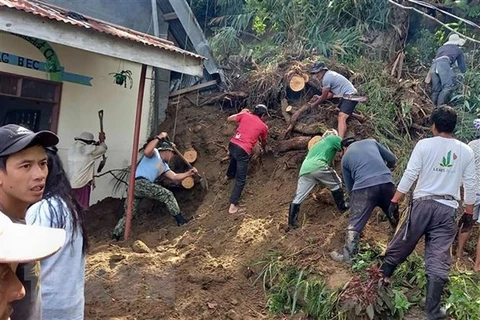Hanoi (VNA) – Philippines has recorded 319 deaths from dengue fever this year as infections continue to rise during the wet season, according to the Department of Health (DOH).
The DOH had recorded 82,597 cases as of July 16, 106% higher than the cases recorded in the same period last year, Health Undersecretary Maria Rosario Vergeire was quoted by local media as saying on August 2.
DOH data showed the Central Luzon region recorded the highest cases with over 13,000, followed by the Central Visayas region with nearly 9,000, and Metro Manila with almost 7,000.
Vergeire added that 10 of the South-East Asian country's regions "have already exceeded the epidemic threshold in the past four weeks from June 19 to July 16 with three areas showing a sustained increase in the same period.
Dengue is endemic in the Philippines. The water-borne infectious diseases, including dengue, usually peak at the start of the rainy season from July to October due to fluctuating weather conditions, flooding, and accumulation of contaminated water.
In severe cases, dengue can cause joint pain, nausea, vomiting, rashes, breathing problems, hemorrhaging and organ failure.
The Philippines declared a "national dengue epidemic" in August 2019 due to an increasing number of people who died from the disease in the Southeast Asian country./.
The DOH had recorded 82,597 cases as of July 16, 106% higher than the cases recorded in the same period last year, Health Undersecretary Maria Rosario Vergeire was quoted by local media as saying on August 2.
DOH data showed the Central Luzon region recorded the highest cases with over 13,000, followed by the Central Visayas region with nearly 9,000, and Metro Manila with almost 7,000.
Vergeire added that 10 of the South-East Asian country's regions "have already exceeded the epidemic threshold in the past four weeks from June 19 to July 16 with three areas showing a sustained increase in the same period.
Dengue is endemic in the Philippines. The water-borne infectious diseases, including dengue, usually peak at the start of the rainy season from July to October due to fluctuating weather conditions, flooding, and accumulation of contaminated water.
In severe cases, dengue can cause joint pain, nausea, vomiting, rashes, breathing problems, hemorrhaging and organ failure.
The Philippines declared a "national dengue epidemic" in August 2019 due to an increasing number of people who died from the disease in the Southeast Asian country./.
VNA
























